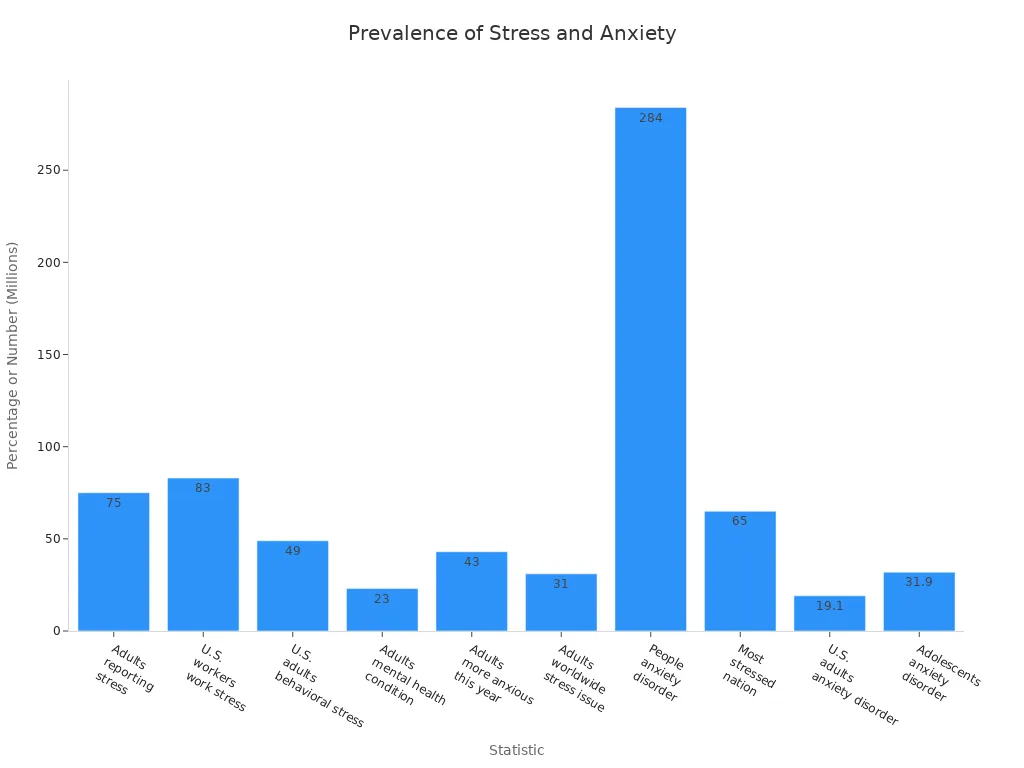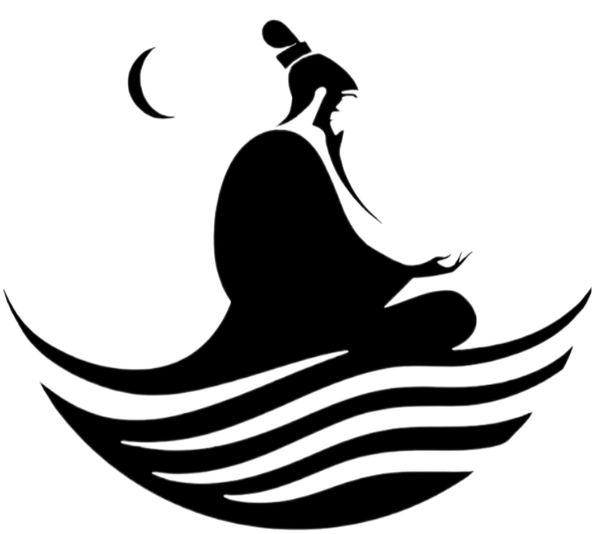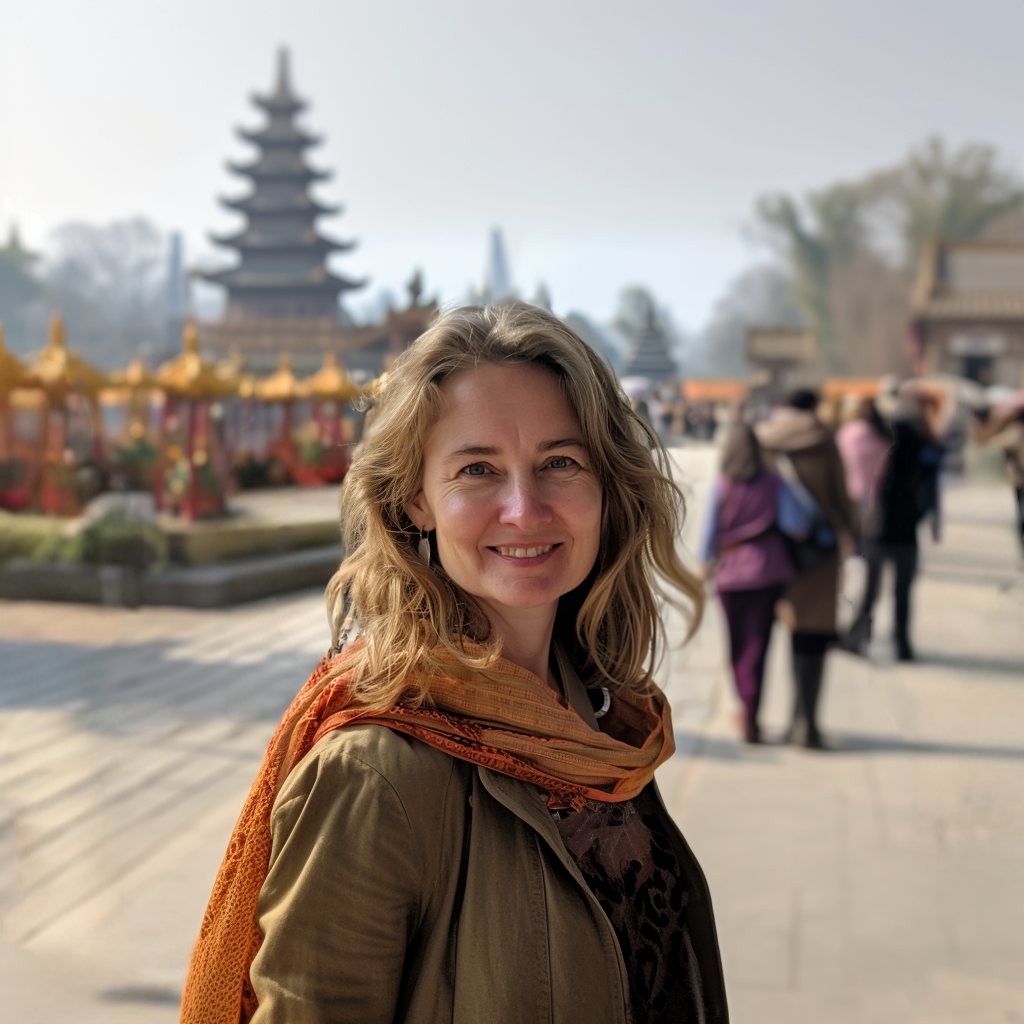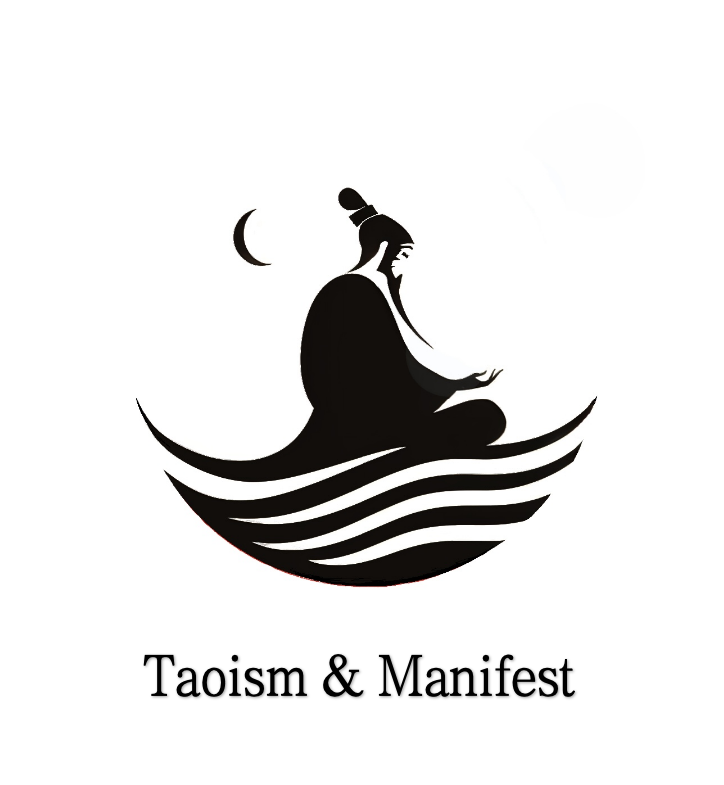
Lessons on mindfulness from Zhuangzi’s writings

You probably see stress everywhere. It can happen at work. It can happen at school. You might feel it when you look at your phone. Here is a chart that shows how common stress and anxiety are today:

Zhuangzi’s lessons on mindfulness ask you to let go of strict rules. Try to enjoy life as it happens. His fun way of thinking can help you feel calm. You can feel better even when life seems hard.
Key Takeaways
Try to have fun in life. Do not worry about strict rules. Do not let worries weigh you down. Enjoy each moment as it comes.
Learn to stop trying too hard. Happiness comes when you stop chasing it. Accept life as it is. Find joy in simple things.
Go with the flow of life using wu wei. Act in a natural way. Do not force things to happen. This can help you feel less stressed. It helps you become more flexible.
Change how you see value. Appreciate things that seem useless. Find joy in being yourself. Do not judge your worth by how much you do.
Live in a simple way to feel calm. Clean up your space. Focus on what matters most. Being simple can lower stress and make you happier.
Zhuangzi’s Lessons on Mindfulness
Living Lightly and Playfully
Zhuangzi invites you to see life as a playful adventure. He teaches that you can let go of heavy worries and strict rules. Instead, you can move through your day with a light heart. Zhuangzi lived during a time when people often followed rigid traditions. He stood out because he focused on the difference between what is natural and what is artificial. His lessons on mindfulness encourage you to be true to yourself, not just follow what others expect.
You might wonder how to live lightly in a busy world. Here are some ideas from Zhuangzi’s stories:
Cripple Shu lives freely, never feeling shame about who he is.
The frog in the well shows how narrow thinking can trap you. Zhuangzi wants you to jump out and explore.
The gnarled tree survives because it does not try to fit in. It stays strong by being itself.
You can use these lessons on mindfulness in your own life. Try to declutter your space. Clean out your room or your mind. Make simple choices. Focus on what matters most. When you buy less and do less, you feel less overwhelmed.
Tip: Next time you feel stressed, ask yourself, “Can I make this lighter?” Sometimes, just taking a deep breath or laughing at a mistake helps you let go.
Letting Go of Striving
Zhuangzi says you do not need to chase after happiness or success. He believes that happiness comes when you stop trying so hard. Nature shows us this lesson every day. Birds and fish do not worry about their purpose. They just live.
You can see this idea in Zhuangzi’s stories:
In "The Happy Fishermen," two friends find joy in simple living. They do not care about wealth or status.
The butterfly dream teaches you that your identity can change. You do not have to hold on tightly to one idea of yourself.
Woodworker Ch’ing finds true skill by letting go of distractions and being still.
Letting go of rigid expectations helps you feel free. You grow as a person. Your relationships improve. You focus better. When you accept that life changes, you find peace even when things feel uncertain.
“By embracing nonattachment, we can also let go of rigid expectations and perfectionistic tendencies, leading to reduced rumination, resentment, and emotional suffering.”
Here are some ways to practice letting go:
Focus on your effort, not just the results.
Treat setbacks as chances to learn.
Stay motivated by making small progress.
Accept that you cannot control everything.
Modern mindfulness practices reflect Zhuangzi’s ideas. For example, Zuowang meditation asks you to let go of all intention. You do not need to reach a goal. You just sit and let your mind rest.
Aspect |
Zuowang |
Other Meditation Practices |
|---|---|---|
Focus |
Total mental release |
Structured techniques |
Intent |
Letting go of all intention |
Maintaining deliberate awareness |
Outcome |
Effortless awareness |
Specific outcomes aimed for |
Alignment with Philosophy |
Aligns with Tao and Zhuangzi's ideas |
Varies by tradition |
When you let go of striving, you open yourself to new experiences. You become more flexible. You feel less stress and anxiety. These lessons on mindfulness from Zhuangzi can help you enjoy life as it is, not just as you wish it to be.
Effortless Action (Wu Wei)

Aligning with the Flow
You might hear the phrase "go with the flow" all the time, but Zhuangzi gives it a deeper meaning. Wu wei means effortless action. You act without forcing things. You let life unfold naturally. Zhuangzi teaches that you can find peace by aligning with the Tao, the natural order of the world. The Tao works without effort or intent. When you follow this path, you stop fighting against what happens.
It is rooted in Taoist ideas, focusing on harmony with nature.
Zhuangzi uses wu wei to show how sages avoid getting caught up in worldly affairs.
The Tao connects everything, treating life and death as one.
Modern psychology talks about "flow states." Artists and athletes describe moments when they lose themselves in what they do. They do not overthink or chase perfection. Zhuangzi’s stories, like Cook Ding carving with ease, show this same flow. You can feel it when you get absorbed in a hobby or sport.
Want to try wu wei in your daily life? Here are some tips:
Break big jobs into small steps.
Use a timer to track your focus.
Take breaks when you need them.
Check in with yourself and adjust your routine.
You can also plan around your energy peaks, keep a regular sleep schedule, and take active breaks. Exercise and learning help you stay in the flow.
Finding Happiness in Acceptance
Zhuangzi’s lessons on mindfulness show that happiness comes when you stop striving. You accept things as they are. He tells stories about fish swimming freely and people finding joy by letting go.
Zhuangzi and Huizi were strolling along the bridge over the Hao River. Zhuangzi said, “The minnows swim about so freely, following the openings wherever they take them. Such is the happiness of fish.”
Do not struggle. Go with the flow of things.
Happiness is the absence of the striving for happiness.
Flow with whatever may happen and let your mind be free.
Mindfulness practices that focus on acceptance can boost your happiness. Studies show that people who learn to accept their thoughts and feelings feel better and less stressed. Here is a quick look at some research:
Study |
Findings |
|---|---|
Harnett et al., 2010 |
Mindfulness-based intervention had a noteworthy impact on life satisfaction. |
Rasanen et al. |
Significant increase in well-being, life satisfaction, and mindfulness among participants. |
Gupta and Verma, 2020 |
Individuals with trait mindfulness tended to have higher scores of life satisfaction. |
You do not need to force happiness. You can let it come by accepting what is happening right now. These lessons on mindfulness from Zhuangzi help you find peace in everyday life.
Embracing Uselessness
The Useless Tree Parable
Have you ever felt like you need to be useful all the time? Zhuangzi tells a story about a tree that people call useless. Carpenters ignore it because its wood is not good for building. The tree grows old and huge because nobody cuts it down. It stands tall, giving shade and peace.
The story of the Useless Tree shows that what seems useless can have deep meaning. The tree survives and thrives because it does not fit into society’s idea of usefulness.
Zhuangzi shares other stories, too. He talks about a turtle that lives happily because nobody wants it for work. He describes a large gourd that could have been used for floating, but someone throws it away because it seems useless. These stories invite you to see value in things that others overlook.
You do not have to measure your worth by how productive you are. Sometimes, just being yourself is enough. When you stop chasing usefulness, you find space to relax and enjoy life.
Redefining Value
Zhuangzi asks you to question what society calls valuable. He believes that true happiness comes from knowing your own needs and not following the crowd. Xu You, a wise man in Zhuangzi’s writings, refuses power and fame. He chooses a simple life and feels content.
You can learn from these lessons on mindfulness. Try to enjoy small moments, like watching clouds or listening to birds. These simple pleasures can lower stress, help you focus, and make your relationships stronger.
Embracing what seems useless can bring more joy and less stress.
You can grow by letting go of strict ideas about success.
Life does not have to be about constant productivity.
Being present and authentic matters more than meeting others’ expectations.
The Zhuangzi tells the story of a wondrous tree, so large that its canopy provided shade for thousands of oxen. The tree only became this large because its wood was deemed to be 'useless' for any human project. As a result, it was left alone and allowed to grow into its magnificent size.
If you want to explore more ways to find calm and meaning, you can read "How Taoism Can Help You Find Calm in a Chaotic World".
Harmony and Equanimity

Integrating Experience
Life has good times and bad times. Zhuangzi teaches you to accept every moment. You should welcome all your feelings. This helps you stay balanced. You do not have to hide sadness. You do not need to chase happiness. Both feelings can be there together.
Zhuangzi’s idea of responsive harmony means you should adapt and work with others. True harmony comes from knowing what makes each person special in a relationship.
You can use this lesson every day. Listen to people and respect their differences. This helps you make harmony. You also learn more about yourself. Research shows mixing happy and sad feelings helps people feel calm and steady.
Findings |
Implications |
|---|---|
Older adults have steadier emotions |
This helps them feel stable and well |
Feeling happy and sad at the same time |
This helps people feel balanced and well |
Emotions get steadier as people age |
This shows people can control feelings better and feel happier |
If you want to feel balanced, notice your feelings. Do not judge them. You can write in a journal. You can talk with a friend. This helps you understand yourself and grow stronger.
Tranquility in Simplicity
Zhuangzi teaches that peace comes from living simply. He tells a story about his wife’s death. He does not mourn. He celebrates her life and accepts change.
In a story about his wife’s death, Zhuangzi shows peace by celebrating life. He says, “If I cried and sobbed, it would mean I do not understand fate. So I stopped.” This shows he accepts change and finds peace in simple living.
You can find peace by clearing clutter. Focus on what matters most. Living simply helps you feel less stressed and more happy.
Minimalism means buying less and living simply. This helps you feel better.
Messy rooms can raise stress and anxiety.
A study in 2020 found minimalism lowers stress by 75% and boosts happiness by 80%.
About 80% of studies show simple living helps people feel better.
Living simply can help you save money and feel happier.
People who practice equanimity recover faster from problems. You can build strength and lower stress by living simply.
Equanimity helps people feel less worried and stressed. It helps them stay calm, even in hard times, like healthcare workers during crises.
Mindfulness can lower stress hormones by 25%. This helps people feel better at work and in life.
People with high equanimity bounce back 20-30% faster from setbacks. Studies in work psychology show this.
You can use Zhuangzi’s mindfulness lessons every day. They help you find peace and stay present. Try this easy practice: take three slow breaths before you do something new. Notice how you feel after you breathe. Zhuangzi teaches you to keep an open mind. He wants you to be flexible and humble. Mindfulness helps your brain work better. It helps your body feel good. It can also lift your mood. Think about how these old ideas can help you with stress and anxiety now.
You do not have to be perfect. Just focus on being present.
Benefit |
What You Gain |
|---|---|
Open-mindedness |
You understand more |
Epistemic modesty |
You feel less pressure |
Flexibility |
You solve problems easier |
FAQ
What does Zhuangzi mean by “living lightly”?
Zhuangzi wants you to let go of heavy worries and strict rules. You can enjoy life more when you stay flexible and open-minded. To understand the foundational ideas, explore What Is Taoism.
How can I practice wu wei in daily life?
You can try doing things without forcing them. Let tasks flow naturally. Take breaks and listen to your energy.
Why does Zhuangzi value “uselessness”?
Zhuangzi teaches that things called “useless” can have hidden value. You do not need to prove your worth all the time. Sometimes, just being yourself is enough. If you want to explore the famous Butterfly Dream and how it challenges our ideas of reality and identity, read How Zhuangzi Dreaming Makes Us Doubt Reality.
Can mindfulness help with stress and anxiety?
Yes! Mindfulness helps you notice your feelings and accept them. You can feel calmer and less stressed. Try taking three slow breaths when you feel anxious.
Is Zhuangzi’s mindfulness different from other practices?
Zhuangzi’s mindfulness focuses on playfulness, acceptance, and letting go. You do not need to chase perfection. You can enjoy life as it is.





